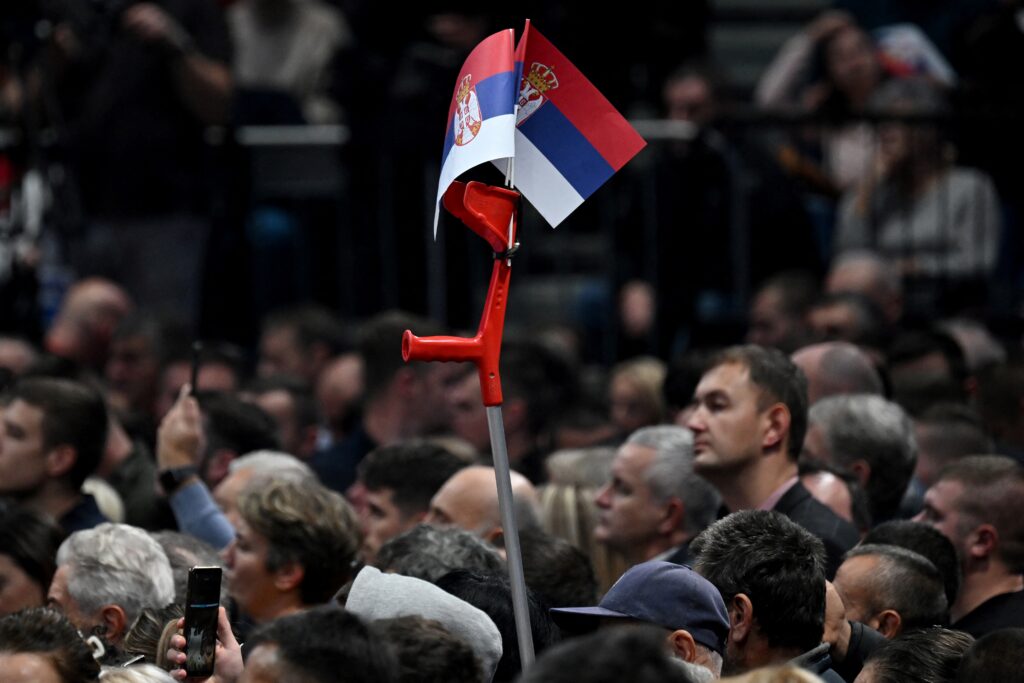
A man waves Serbian flags hanging on a crutch during a political rally of the Serbian Progressive Party (SNS) at the Stark Arena in Belgrade on December 2, 2023, ahead of the December 17 elections.
Photo by Andrej ISAKOVIC / AFP
Against the backdrop of persistent tensions in Kosovo, a resurgent migration crisis, and the Russo-Ukrainian war which has made its usual diplomatic balancing act between Moscow and Brussels all the more difficult, Serbia, for the fifth time in just over a decade, is set to hold national parliamentary, provincial, and local elections on December 15th.
The snap elections, announced by President Aleksandr Vučić last spring in the wake of intense public backlash over two shootings in two days that left 18 dead, will see Serbs elect a new parliament as well as deputies in the Assembly of Vojvodina, local councilors, and mayors across 65 cities and municipalities including the capital Belgrade.
Anticipated to secure yet another victory in the parliament by a considerable margin, President Vučić’s Serbian Progressive Party-led coalition ‘Together We Can Do Everything,’ whose main partner is the Serbian Socialist Party, is however poised to be tested in a way that it hasn’t been in past elections by a united, left-liberal bloc.
The Serbian opposition is organized into three main blocs, the strongest of which is the left-liberal, Brussels-aligned, ‘Serbia Against Violence’ coalition. The two remaining blocs are composed of a collection of right-wing parties.
Challenging Vučić from the Right are the ‘National Gathering’ coalition, made up of Dveri and Serbian Party Oathkeepers, and the ‘Hope for Serbia’ coalition, composed of National Democratic Alternative, New Democratic Party of Serbia, and Movement for the Restoration of the Kingdom of Serbia. Collectively, the two coalitions are expected to garner some 10-12% of the national vote.
Dveri’s international secretary Andrej Mitic told The European Conservative
National Gathering, with its leaders Bosko Obradovic and Milica Djurdjevic-Stamenkovski, represents the Third Way in Serbian politics, between the actual ruling party and former ruling left-liberals, now united, but still belonging to the system.
The upcoming elections, for Mitic, will present Serbians with a choice between “pro-family, pro-national sovereignty policies” and an “aggressive, pro-Brussels, globalist-transhumanist agenda” as well as a choice between “accepting ultimatum or keeping the Constitution and Kosovo and Metohija.”
From the Left, there is the Serbia Against Violence bloc, led by the Democratic Party, Party of Freedom and Justice, Green-Left Front, and Together. The coalition also includes 11 smaller parties of varying but similar ideological persuasions. Initially conceived informally during protests that ensued following the Belgrade elementary school and Mladenovac and Smederevo mass shootings in May 2023, the parties in anti- Vučić coalition formally cemented their ties shortly thereafter.
Polling at close to 40% nationally, the Serbia Against Violence bloc claims that the administration led by Vučić fosters a culture of brutality which is spread in part by divisive television programs and vulgar reality shows.
“I am confident that the results will show that citizens are fed up with violence, corruption, and crime generated by the ruling party,” Dobrica Veselinović of the Green-Left Front,” told European media, adding that the left-wing opposition had “energized a large number of citizens and encouraged them to become involved” more so than in past years.
Vučić’s coalition remains comfortably in the lead, sitting at around 49%, according to the independent election monitor CRTA.
In the capital Belgrade, however, Serbia Against Violence is tipped to win the city’s treasured mayoral seat, after having lost last year’s race by a slim margin, according to sociologist Srecko Mihailovic, a pollster at the Serbian Research-Publishing Centre, Demostat.
“The opposition now probably has [a chance at achieving] even better results, but they need to be careful because there are many civil servants in Belgrade and people employed in state institutions who will come under pressure to vote for the ruling party,” Mihailovi told the BIRN Serbia.
Although there is growing discontent among the Serbian population with Vučić and the policies his government pursues, polling results do indicate, for better or for worse, that he’s still regarded by most of the population to be the only leader who can tactfully and pragmatically navigate the increasingly choppy waters Serbia will have to traverse on the world stage. Issues like Kosovo and Serbia’s ability to position itself strategically between the EU and Russia are central.
Peter Miluntinović, a researcher at the Institute for European Studies in Belgrade, told The European Conservative that the “dominant position” currently enjoyed by Vučić’s ruling coalition is, at least in part, due to its “propaganda and media outreach,” adding that it has also been able to effectively mobilize “the masses of citizens by providing them with cash payments and food.”
Regardless of what may be regarded as underhanded tactics, Miluntinović underscored that it still appears as though Vučić “remains a force which can maintain Serbia’s strategic interests while not choosing the West over the East, nor vice versa.”
The future government, he said, will have to reestablish its legitimacy in the face of a “set of serious issues ranging from Serbia’s choice of EU integration or BRICS cooperation to the issues of fighting organized crimes and corruption at the local level.”
